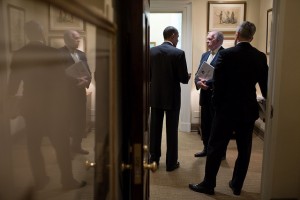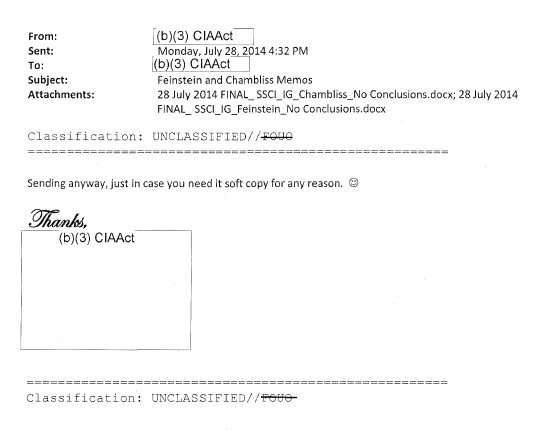As the Daily Dot reported, Senators Wyden, Heinrich, and Hirono wrote John Brennan a letter trying to get him to admit that he lied about hacking the Senate Intelligence Committee.
But, as often happens with Wyden-authored letters, they also included this oblique paragraph at the end:
Additionally, we are attaching a separate classified letter regarding inaccurate public statements that you made on another topic in March 2015. We ask that you correct the public record regarding these statements immediately.
A game!!! Find the lies Brennan told in March!!!
The most likely place to look for Brennan lies comes in this appearance at the Council on Foreign Relations, where Brennan took questions from the audience.
While you might think Brennan lied about outsourcing torture to our allies, his answer on CIA involvement with interrogations conducted by our partners was largely truthful, even if he left out the part of detainees being tortured in custody.
But on a related issue, Brennan surely lied. He claimed — in response to a questions from an HRW staffer — not to partner with those who commit atrocities.
QUESTION: I’m going to try to stand up. Sarah Leah Whitson, Human Rights Watch. Two days ago, ABC News ran some video and images of psychopathic murderers, thugs in the Iraqi security forces, carrying out beheadings, executions of children, executions of civilians. Human Rights Watch has documented Iraqi militias carrying out ISIS-like atrocities, executions of hundreds of captives and so forth.
And some of the allies in the anti-ISIS coalition are themselves carrying out ISIS-like atrocities, like beheadings in Saudi Arabia, violent attacks on journalists in Saudi Arabia—how do you think Iraqi Sunni civilians should distinguish between the good guys and the bad guys in this circumstance?
BRENNAN: It’s tough sorting out good guys and bad guys in a lot of these areas, it is. And human rights abuses, whether they take place on the part of ISIL or of militias or individuals who are working as part of formal security services, needs to be exposed, needs to be stopped.
And in an area like Iraq and Syria, there has been some horrific, horrific human rights abuses. And this is something that I think we need to be able to address. And when we see it, we do bring it to the attention of authorities. And when we see it, we do bring it to the attention of authorities. And we will not work with entities that are engaged in such activities.
As I noted at the time, Brennan totally dodged the question about Saudi atrocities. But it is also the case that many of the “moderates” we’ve partnered with in both Syria and Iraq have themselves engaged in atrocities.
So I suspect his claim that “we will not work with entities that are engaged in such activities” is one of the statements Wyden et al were pointing to.
A potentially related alternative candidate (the letter did say Brennan had made false statements, plural) is this exchange. When Brennan claimed, at the time, he has no ties to Qasim Soleimani, I assumed he was lying, not just because we’re actually fighting a way in IRGC’s vicinity but also because Brennan seemed to exhibit some of the “tells” he does when he lies.
QUESTION: James Sitrick, Baker & McKenzie. You spent a considerable amount of your opening remarks talking about the importance of liaison relationships. Charlie alluded to this in one of his references to you, on the adage—the old adage has it that the enemy of your enemy is your friend. Are we in any way quietly, diplomatically, indirectly, liaisoning with Mr. Soleimani and his group and his people in Iraq?
BRENNAN: I am not engaging with Mr. Qasem Soleimani, who is the head of the Quds Force of Iran. So no, I am not.
I am engaged, though, with a lot of different partners, some of close, allied countries as well as some that would be considered adversaries, engaged with the Russians on issues related to terrorism.
We did a great job working with the Russians on Sochi. They were very supportive on Boston Marathon. We’re also looking at the threat that ISIL poses both to the United States as well as to Russia.
So I try to take advantage of all the different partners that are out there, because there is a strong alignment on some issues—on proliferation as well as on terrorism and others as well.
I happen to think it an exaggeration that the Russians “were very supportive on Boston Marathon,” but maybe that’s because FSB was rolling up CIA spies who were investigating potentially related groups in Russia.
Finally, while less likely, I think this might be a candidate.
QUESTION: Thank you. Paula DiPerna, NTR Foundation. This is probably an unpopular suggestion, but is it feasible or how feasible would it be to do a little selective Internet disruption in the areas concerned, a la a blockade, digital blockade, and then an international fund to indemnify business loss?
BRENNAN: OK. First of all, as we all know, the worldwide web, the Internet, is a very large enterprise. And trying to stop things from coming out, there are political issues, there are legal issues here in the United States as far as freedom of speech is concerned. But even given that consideration, doing it technically and preventing some things from surfacing is really quite challenging.
And we see that a number of these organizations have been able to immediately post what they’re doing in Twitter. And the ability to stop some things from getting out is really quite challenging.
As far as, you know, indemnification of various companies on some of these issues, there has been unfortunately a very, very long, multi-year effort on the part of the Congress to try to pass some cybersecurity legislation that addressed some of these issues. There has been passage in the Senate.
I think it’s overdue. We need to update our legal structures as well as our policy structures to deal with the cyber threats we face.
Remember, Ron Wyden has been pointing to an OLC opinion on Common Commercial Services (which, however, CIA’s now General Counsel Carolyn Krass said publicly she wouldn’t rely on) for years. I suspect indemnity is one of the things it might cover.
Plus, I do think it likely that we’ve disrupted the Internet in various circumstances.
Who knows? Maybe Brennan just told a lot of lies.
It wouldn’t be the first time.
Update: NatSec sources are already dismissing this Sy Hersh piece on the real story behind the bin Laden killing. But if there’s truth to this detail, then it would suggest I was overly optimistic when I suggested Brennan was truthful about outsourcing our interrogation to allies.
The retired official told me that the CIA leadership had become experts in derailing serious threats from Congress: ‘They create something that is horrible but not that bad. Give them something that sounds terrible. “Oh my God, we were shoving food up a prisoner’s ass!” Meanwhile, they’re not telling the committee about murders, other war crimes, and secret prisons like we still have in Diego Garcia. The goal also was to stall it as long as possible, which they did.’
If we do still have a secret prison in Diego Garcia, then the claim that we outsource everything to allies would be the key lie here.



